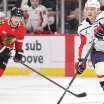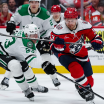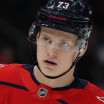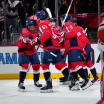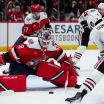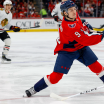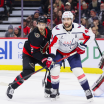It's been nine years since the Capitals weren't in the Stanley Cup Playoffs, and it's been almost three years since they've undertaken a search for a new head coach. But in the days immediately following the conclusion of a difficult season that fell short of expectations and standards, the Caps are once again in the market for a head coach, and they're seeking a few new faces on their coaching staff as well.
Looking for Mr. Right
As Cup playoffs push on without them, Caps undertake search for trio of coaching staff vacancies
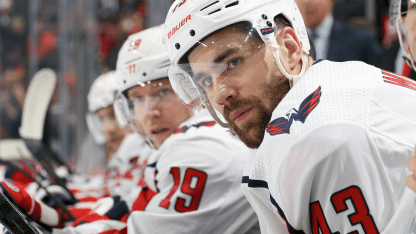
By
Mike Vogel
WashingtonCaps.com
Friday's news that Peter Laviolette and the Capitals came to a mutual decision not to pursue a contract extension was followed by Monday's news that assistant coaches Blaine Forsythe and Kevin McCarthy would not be returning. Washington has made some tweaks in its coaching staff over the last nine years, and it has even changed head coaches twice, doing so five summers ago in the wake of its Stanley Cup championship summer of 2018 and again two years later, following its playoff ouster in "the bubble" in August of 2020.
This time around, the Caps will have three coaching vacancies to fill, and they've had a lot of coaching experience go out the door in the last week; each of the departures are all longtime veterans of the game and the League. Laviolette is the only person to serve as head coach in every NHL season since 2001-02, and McCarthy has been in the coaching game even longer. He began his NHL coaching career as an assistant coach with the Hartford Whalers in 1992-93, and he has served as an assistant in every NHL season since 1999-00.
Forsythe is the longest tenured of the trio here in D.C., he started out as Washington's video coach in 2006-07, and after two seasons at that post he served as an amateur scout with the Caps in 2008-09. The following season, he began a 14-year run as an assistant coach in D.C., and he was a part of a top-notch Caps' coaching staff that helped the team to the Stanley Cup in 2018. No one has served as a Washington assistant coach for longer than Forsythe.
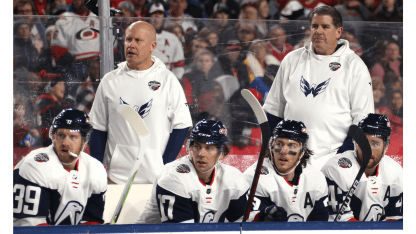
Now the Caps are in the position of remaking most of their staff, an undertaking they have not been tasked with since 2014, when they also replaced George McPhee following a 17-year run as the team's general manager.
When Barry Trotz departed the District in June of 2018, there was no coaching search, just a changing of the guard. The term "associate coach" has become somewhat synonymous with "head coach in waiting," and that proved to be the case when Todd Reirden ascended to the post here half a decade ago. The Caps did have to replace Reirden as an assistant and also had to replace assistant coach Lane Lambert, who went with Trotz to his next post with the New York Islanders.
When Laviolette was hired to replace Reirden in Sept. of 2020, he was in some ways the obvious choice. The Caps seemed destined to replace Reirden - a first-time NHL head coach - with an experienced bench boss, and Laviolette didn't carry the toxic résumé that some other candidates had at the time of that search.
Laviolette brought McCarthy with him; the two have coached together in four different NHL cities, winning the Stanley Cup with Carolina in 2006 and reaching the Cup Final with Philadelphia in 2010 and with Nashville in 2017. Laviolette opted to keep each of Washington's holdover assistants when he took over.
This summer, the Caps need a new head coach and they also need a couple of new assistants. The last time Washington found itself in this position of needing a head coach and multiple assistants, it hit a home run, assembling a remarkable staff that included holdover assistant Forsythe as well as assistants Reirden and Lambert as well as goaltending coach Mitch Korn, who is - along with Trotz - a likely future Hockey Hall of Famer. Four summers after beginning their working relationship together, that group helped the Caps win the hardware in Vegas.
As the Caps prepare to search for a new voice behind the bench and seek to add new minds and fresh perspectives to assist their next head coach, it's natural to wonder which direction this search might take.
With an aging core that now has just six remaining members from the '17-18 championship team, the organization has stated its intention to contend for the playoffs and another Cup during the three seasons remaining on captain Alex Ovechkin's contract. But it also recognizes the need to inject the elements of speed and youth into its lineup, and to keep up with a game that is ever changing.
"I think it's a challenge where we're going to have some young guys that need development, that need patience," says Caps' senior vice president and general manager Brian MacLellan. "And then we're going to have some older guys that need an experienced coach, or that need to communicate with an experienced coach. So it's going to be some combination of that, the candidate that would be perfect. But we'll talk to guys and see if we can figure out here in the next couple of months."
Given that the 2022-23 season just ended, there are no obvious choices - like Trotz was in the spring of 2014 - sitting prominently on the unemployed hockey coach shelves these days. And in fact, whomever will be running the Washington bench next season is likely gainfully employed right now, and it may even be someone who is helping his current employer navigate the Stanley Cup - or even Calder Cup - playoffs right now.
"We'll see how it shakes out here," MacLellan told the media on Saturday. "We'll start looking at names and - with our group - talk about different coaches that people know and traits they have. Maybe we have to wait to talk to some assistant coaches that we think are candidates. We'll see how it goes here."
MacLellan is likely going to want to speak to candidates who are still working, and that could take some time. Trotz was named coach on May 26, 2014, after a search that lasted for weeks and one that ran concurrently with a search for the team's next general manager. Washington's last three summer head coaching hires before Trotz took even longer.
Adam Oates accepted the head coaching gig on June 26, 2012. Before him, Bruce Cassidy took over the coaching reins on June 25, 2002. And Ron Wilson - who came on board the same day that McPhee's tenure as GM began - was hired on June 9, 1997.
Adding a couple of assistant coaches could stretch the process out even longer, given that the head coach typically has some say so in those hires.
As currently constituted, the Caps' roster has several players who are in their thirties, and who are clearly at various stages of the back halves of their careers. There are also a number of younger players on the roster who don't have as much time in the League or the organization.
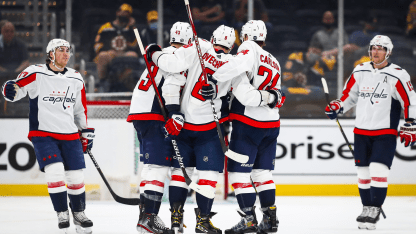
Six players remain from Washington's 2017-18 Stanley Cup championship team, and it's also reasonable to expect an influx of younger players from AHL Hershey next season. While the Caps have typically done well in using the free agent market to fill in the edges of their roster, they're likely to promote at least some younger players from AHL Hershey to full-time roles here in Washington next season.
"I think it's a strength that we've always been able to complement the core with efficient players that produce, given their salaries," says MacLellan. "That's kind of what we do, and we'll be looking to do it with younger players here next year, filling in holes with [Beck] Malenstyn, with [Connor] McMichael, with [Aliaksei] Protas. I think the focus will change to those guys, versus finding veteran players on cheap deals."
When the Caps conducted breakdown day this past Saturday, we discussed the coaching vacancy with a few of Washington's veteran players, wondering what attributes they themselves would be seeking if they were the ones making the decision. And let's be clear here; they're not the ones making the decision. MacLellan and his hockey operations staff will be conducting the search and the interviews, and they'll be crafting the list of interviewees.
That said, MacLellan does expect to keep Ovechkin apprised as the process takes shape.
"We've talked in general about stuff," says MacLellan of the lines of communication with his team's captain. "I'm going to communicate with him, you know, 'Here's what we're thinking, and here's the strengths of the guy coming in, and here's where he might need help.' We'll have those discussions.
"It's more keeping him informed of what the strategy is and what we're thinking. I think he deserves that respect. Even at trade deadline, I gave him a heads up on what we were thinking and what might happen. I think we need to respect his status in the game and his status with the organization."
When we broached the topic with Ovechkin, he politely demurred.
"To be honest, I never thought about this happening," says Ovechkin. "This happened a day ago, less than 24 hours ago. So I never thought about the next guy, or who is going to be our coach. It's kind of hard, because the relationship that we built here with Lavi and with previous coaches, it was tight. So I don't know, we'll see."
Fortunately, some of Ovechkin's teammates were a bit more forthcoming with their thoughts on the process.
"It's tough," says Caps' right wing Tom Wilson, the youngest of the remaining half dozen players from the '17-18 Cup team. "Obviously, I don't have to make those decisions, but it's a group that has a tremendous amount of experience and it has a leadership group that's probably second to none around the league. That being said, there's an element of having somebody that's well respected and someone to have a relationship with those guys, and with a guy like [Ovechkin], and all he has done.
"To me, a good coach understands his players. He understands what his players need and what his players want. And I think that's important. The coaches you've seen that we've had good success under are well respected guys who have been around the game a long time. Guys like Trotzy and Lavi, guys like that come in and they have a presence to the room. I think that's important.
"I think we need just a bit of a fresh perspective. Maybe some element of a guy that has some skill background, or an assistant coach or something like that. I think the game is changing really quickly, and something we could have around here a little bit more is just working with the younger guys and developing that on ice skill stuff. But I'm a guy who gives his all no matter who you're playing for. I've had a great experience playing for Lavi; he is an amazing human being. He is top of the charts as far as coaching for a long time now. You always feel privileged getting to work with a guy of his experience and what he's done in the game. So it's never easy when you feel like a player and a coach and you couldn't get it done. But that being said, we will get back to the drawing board here and see who comes in, and we'll get the ship moving in the right direction."
For the first time since 2011, Caps winger T.J. Oshie is on the outside looking in at playoff time. He has played under the likes of Andy Murray, Ken Hitchcock, Trotz, Reirden and Laviolette over the course of his 15 seasons in the NHL.
"That's a difficult question," says Oshie. "I guess I'll start by saying that these aren't qualities that we've necessarily been missing. But more so these are qualities that I see in just a good coach that could get us in that championship mode. Anytime a new face comes in, it always seems to light a fire under guys just in general, because when you get a new coach, essentially you start practicing and playing for your ice time and you're respecting that coach.
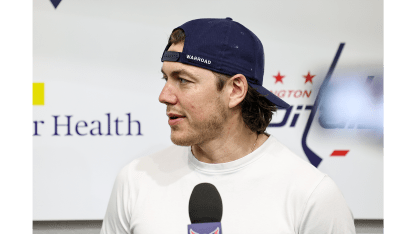
"So a new face in general is going to bring a little bit of fire to the guys. But I think with an older team and with some of the veterans we have, I think someone that is typically in a little bit more of a regular dialogue with the older guys on the team, and someone that will hold everyone from top to bottom accountable on the ice in their play. Someone that is a good teacher of their systems and someone that gets through to not only your best players and not only your best defensive players, but someone who can get through and teach their systems - whatever they may be - so that everyone on the team knows their job at all times.
"And also, a big part I think from here moving forward is someone that can take young players and either quickly teach them the NHL game or quickly bring out their best attributes and turn them into a good NHL player at a young age. And I think that is a difficult job because a lot of times - especially with young [defensemen] - you need experience. But moving forward, I think we're going to rely on some young guys to come in here and make a difference, and I think you're going to need a coach that can develop them quickly."
Aside from the half dozen holdovers from the Stanley Cup season half a decade ago, center Nic Dowd is the longest tenured Washington veteran. He came to the Caps in 2018-19 and has blossomed into one of the game's best and most consistent fourth line centers, embracing a role that Laviolette trusted him to handle.
"Today's NHL has changed quite a bit, to where I think you need a coach that is open to how players think and is open to their opinions and suggestions," says Dowd. "The last thing you want is players mentally fighting the team on how they believe the system or the team should be run. From the top down, you want your head coach to your top players to your rookies to be an extension of each other. And you want your top players to essentially have an open conversation with your head coach and your coaching staff, not that that wasn't the case with this one, but I'm just giving you opinions on how I see it with whoever is going to be behind the bench.
"But I think Lavi did a great job. I don't have a bad thing to say about it, so it's a little challenging to comment on what I want to see from the next coach, because anything I say, it's going to come off as though our previous coach didn't do it, which isn't the case."
Of the last 10 coaches to run the Washington bench, only four - Jim Schoenfeld, Wilson, Trotz and Laviolette - came to the District with previous head coaching experience, and they coached to a combined .581 points percentage here. And of the six that got their first NHL head coaching gigs in D.C., only two - Cassidy and Bruce Boudreau - ever ascended to the same post with another team, and Cassidy waited more than a decade for his second opportunity. The six first-timers coached to a combined .566 points percentage in Washington.
Of the 390 different people to serve as head coaches in the NHL, roughly 65 percent of them coached one team and were finished. The "retreads" such as Laviolette, Trotz, Boudreau and others who go on to coach more than one team account for only about a third of all coaches.
At some point, Scotty Bowman, Barry Trotz, Pat Burns and every other person who has had the job in multiple NHL cities was given the opportunity to run a bench for the first time. Somewhere in the game of hockey right now, the next longtime coaching genius lurks. Somewhere, someone is awaiting that first opportunity, that first job, that springboard to a lengthy and prosperous career in the coaching game.
Given that change is always present in hockey and in the NHL, there is an attraction toward someone who can deliver on the promise of innovating, of being ahead of or at least on the curve of change in the game. The trick is being able to identify that person.
"I think it could definitely be beneficial," says Oshie. "And I think if I stepped into those shoes - which I don't plan on doing - I think a team like ours could really benefit from some forward thinking as far as practice goes and as far as off ice goes. I'm hearing some rumblings of some of the high-octane teams in the League right now having practices that are more based on speed and skill and skill development, and less of the same skate around and 5-on-0 type of practices.
"Anyone that knows me personally knows that my summer's skating is based on skill level, reaction time, creativity, and trying things that are extremely hard that you might never do in a game, but they do develop your hand-eye coordination and they develop your ability to make plays that are unpredictable, to adjust to those and to make those unpredictable plays. We play an unpredictable game, and sometimes practice - if it's the same and if you can do it without thinking - sometimes you're going to go to games without really having your mind focused and ready to react to things.
"As far as my mind goes, a forward thinker in this game and someone that might really be ahead of the curve, is really using practice time for skill development, to keep that skill at a high level throughout the entire season, and not just at the start of the season when you're coming from the summer, and you're playing shinny and trying things that you normally wouldn't try. And then maybe you use your teaching time more in the classroom and the video room and less on the ice."
Wilson also sees a place for an innovator with some fresh ideas.
"I think we could use a little bit of that for sure," he says. "I think Reirden brought an element of that. He was definitely ahead of his time for systems and making switches on the fly and having a conscious effort to address that type of thing. Here, it's such a balance, right? I don't have the answers and I'm not paid to make those decisions, but it's such a balance of an amazing culture that's been built here over the last decade. But there's been a little bit of a changing of the guard with the coaching staff, and with the core getting a little bit older, and myself and everybody getting a little bit older. So we'll see what the management, the scouts and the coaching staff and all that bring to the table.
"As a player, you just have to be ready to go and to do what you're asked and do your job. There's an element as a player - when a coach moves on and isn't back for whatever reason, whether it's mutual or not - you feel a little bit of that weight and that responsibility as well, that you couldn't get it done. And when a new coach comes in, it's our job and our responsibility to execute what they want to the best of our ability. And I think that at points throughout this year, we could have been better at that as well."
Tom Wilson | April 15
One other area of concern for the incoming coach is the Caps' culture, which has been a strong point for the team since Trotz arrived on the scene just under nine years ago. But given the ongoing injuries and other trials and tribulations of the 2022-23 Capitals, that culture began to slip some late in the season.
"We were chasing it the entire year," says Wilson. "And anytime we got healthy and started playing good hockey, something else would happen and we were just behind the eight ball the entire year. And that might sound like an excuse, but it's the reality of the situation.
"And as a player, for the last month it didn't feel right here. For whatever reason, we weren't getting the job done. There were some big games that we could have won, and even after selling at the deadline, we still had a chance to be in. It just seemed like there was a little bit of a check out, and I don't think that was the coach; I don't think guys were doing that on the coach. It just felt like we were behind the eight ball and it's going to be hard. And in the room, we've got to fix that. As a leadership group, we've got to make sure that doesn't happen. The importance of a room and guys that are going to play for each other is super important, if not the most important thing."
A strong culture in the room is one of the elements that has made Washington an attractive place to play. Oshie is among the first of many to come to the team from outside the organization and to sign on to stay longer, with that culture being one of the reasons for wanting to stay.
The Caps are known to have a good room and to have their share of fun when it's time for fun, but they're all business when the puck drops. That culture has been a bit of a magnet for players who come here on short deals via the trade or free agency route; many have signed longer deals to remain here, with the team culture being high on their list of reasons for sticking around.
"I think there's a lot of factors that go into it," says Oshie of the Caps' culture. "Winning is one of them. You win a lot of games, guys have a lot of fun, and I think they want to stay. But for whatever reason, I saw more this year - and more than I've probably seen in my entire career - is guys, and whether they did or not, but guys who looked like on the ice that they didn't necessarily care that much anymore, that they were maybe in a way, checked out. And I've seen people do that throughout my career, and sometimes maybe someone will check out for five games.
"Things go on in people's lives and some of those things can be really hard to play through sometimes. But the continuous people looking like they didn't care or maybe looking like they weren't going to give everything they had to win a Stanley Cup, that to me is unacceptable. When it comes down to it, that's really all I care about is winning and the people next to me. And I think we need a big reset in this room about what we want to do here these next couple of years, because the big man [Ovechkin] is going to do some really special things, and it's going to be the highlight of everyone's career that's here when he does do it. But winning the Stanley Cup I think has to go along with it, and the guys that want to win it, that has to be priority number one, because in my opinion [Ovechkin] is going to get the job done.
"I think we've got to reevaluate and reset the level of heart that we have in this room. And that will bring that culture that we've had that many people talk about and many people want to be a part of. When we bring that and when we have that unanimously, I think that's when you'll start to see us climbing up that leaderboard, and I think that will contribute more to our success than necessarily the style of play that we have on the ice."
Like Oshie, Dowd didn't start his NHL career here, but he found stability and made a home here.
"I would agree," says Dowd. "And I don't think there is anything that Lavi could have done necessarily to change that. But as NHL players, we're mature guys. Sometimes those conversations are hard to have, but in the end, it's the right thing to do with each other. But it's tough to comment on that, because that's an internal thing. But in order to succeed, yeah, you have to fix that."
MacLellan is also aware of the need to shore up what has been a major plus for the organization for nearly a decade now.
"There is frustration on the players' part," acknowledges MacLellan. "I think the whole organization is frustrated. I think we have a standard and a level of play that we've probably gotten away from here at the end of the year, and I think everybody's frustrated, concerned, and looking for ways to make it better.
"I think it's important for training camp and for the start of next year, that we get back to where we've been, establishing work ethic and establishing accountability for each other and for the coach to the players. Yeah, we have some work to do because when that slips, it can slip fast. And you have to grab a hold of it before then. It's not easy to maintain, and I think it's important that everyone is aware of where we want to get to on that."
Can a first-time head coach handle this team and handle the responsibility of shoring up those sagging areas?
"It's a skill and it's a big challenge," says MacLellan. "And that's why experienced coaches get hired a lot. And we have a mix of trying to bring in younger guys while we're trying to finish up some older guys' careers. So it's going to be a challenging job for whoever gets it."
Brian MacLellan | April 15
While the Caps targeted an experienced coach after relieving Reirden of his duties in the late summer of 2020, MacLellan isn't necessarily zeroing in on veteran NHL coach this time around.
"I think we're more open," says MacLellan. "Our group is changing; we're trying to get younger. We've brought in some younger players. It's going to be different in that you want a coach that can work with young guys, and we're going to have a veteran group at the top that kind of needs a veteran coach, so it's going to be challenging to find the right guy for that. Probably a combination of what we've had would be an ideal candidate. I don't know if we could find it, but we'll do the best we can."

